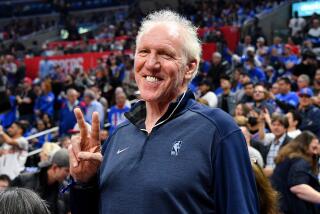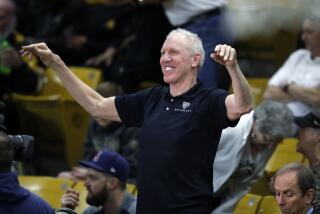For Gault, the Cup Is Half Empty
- Share via
Your team has just won the Super Bowl in a landslide. You caught four passes for 129 yards, setting a Super Bowl record. The press is interviewing you in awed tones, your teammates are clapping you on the back.
Your cup runneth over, right?
Well, if you’re Willie Gault, not exactly.
That’s a life dream for most people, right?
Well, Willie Gault didn’t exactly take it in stride. On the other hand, he didn’t entirely need it.
You see, football might have needed Willie Gault more than Willie Gault needed football.
He was a pinup guy all over Chicago after the Bears toppled New England in Super Bowl XX. But he might have been a pinup guy all over the world if he had never donned a football uniform.
Willie Gault is not just another nimble athlete going out for a long one for the Raiders these days. Willie is, in a sense, a guy trapped by his talent. He’s like a guy who has a great operatic voice--but also can dance. Or paint.
There are those who could almost cry every time they would see Willie out there risking limb if not life running those patterns through the troglodytes of the NFL. He’s trying to be Cliff Branch, Jerry Rice. But track-and-fielders think he should have tried to be Carl Lewis, Ben Johnson, Skeets Nehemiah. To them, it’s a great waste of talent--like Rembrandt doing calendars or Nureyev teaching foxtrots.
Willie Gault, it so happens, was a world class track and field athlete in two events: the sprints and the high hurdles. World records were within his reach in both. Except that some football coach got a clock on him, and from then on all football coaches wanted to do was find a way to get the football to him. They could see images of Rose Bowls, Orange Bowls, Sugar Bowls and Super Bowls dancing in their heads.
The trouble has always been that track and field has always been a subsidiary sport in this country. “Galloping Ghosts” and “Four Horsemen” have always been guys with footballs in their hands, never batons or starting blocks. They’ve never been sprinters or hurdlers or hammer throwers.
Oh, occasionally, one would answer to the sobriquet “World’s Fastest Human,” and the occasional Jesse Owens would stir the national psyche.
An even bigger part of the problem was, with a football (or a bat or a glove) in your hand, you could make a good living. If your prowess was on a track, the best you could hope for was a good scholarship. Once you got out of school, you had to climb onto a truck or into a three-piece suit or go get a wrench or a box of brushes or a 9-to-5 job to make a living.
We lost our athletes just when they were reaching their physical prime if they were runners, jumpers, vaulters or swimmers.
How good could Willie Gault have been? Well, in 1983, when he was a No. 1 draft choice of the Chicago Bears and had been an All-American wide receiver at the University of Tennessee and a bowl game veteran, Gault was good enough to be a bronze medalist in the 110-hurdles at the world championships in Helsinki. He was fifth in the 100-meter dash. Then, he was a member of the four-man relay team that not only broke the world record but became the first to run the event under 38 seconds. Gault’s teammates? Emmitt King, Calvin Smith and Carl Lewis.
To be running in that company was distinction enough. To be running in it coming off spring football practice was to strain belief.
Chi Chi Rodriguez once said of Jack Nicklaus: “He’s a legend in his spare time.” If Willie Gault wasn’t a legend, he was in the company of legends in his spare time.
Willie Gault would play in a Peach Bowl football game and then strip off his shoulder pads and go out and run around 6-flat 60s. He once ran 100 meters in 9.95 seconds, but the wind was fractionally above the allowable limits. He has run 9.3 100-yard dashes. He has run 20.1 in 200s. His time in the hurdles was 13.17.
But those were the days when pro was a dirty word in the Olympics. Common sense has since intervened. Athletic bureaucrats have come to understand that sport is not practiced only by the peerage any more; that no longer can one pursue a career only if he comes from an old House of Lords family or has independent income. Those were the days when the people who ran amateur athletics thought they should be engaged in only by the kind of people who chased foxes over hedges or played polo with the royal family.
You go to college to get ready for a job. You want to be a doctor you go to the lab; you want to be a broker, you go to the economics class--but if you want to be a Chicago Bear, you go to the tackling dummy.
Willie Gault was outraged in 1984 when his professional career was ruled an illegal aid to his track career. He sued the International Olympic Committee, the U.S. Olympic committee and anybody else who stood in his way to trying out for the Olympic team. He lost, but he finds it ludicrous that anybody could think having 280-pound people throw themselves at his knees, bloody his nose, forearm his ribs could possibly enhance his time in the 100.
The irony is, track stars today can make a comparable living to any athlete. Carl Lewis is a millionaire without ever having his facemask pulled, his arm twisted or ankle sprained by a hostile cornerback.
An Olympic gold medal is at least as marketable as a Super Bowl victory.
Willie Gault is sure he could have set records on the track if he could have devoted full time to it. “Let’s say I would have liked the option,” he says.
He came along at a chaotic time. The pooh-bahs were in the process of de-amateurizing tennis and basketball but keeping the screws on track. Then, the 1980 Olympics were boycotted. The Bears looked like a safe haven.
Why would anyone opt to make a living on the Green Bay Packer three-yard line in January in a plastic cage when they could do it in shorts and a tank top in Switzerland and Monaco in July? Why would anyone want a headache sport when they could get in one where the worst that could happen is a scraped knee lunging at the tape?
Willie Gault will be returning to his first love at the 33rd Sunkist Invitational indoor track meet at the Sports Arena Saturday Feb. 15, where he will run the 50-meter high hurdles.
“I think I could have had a gold-medal career if I could have concentrated on track alone,” Gault acknowledges. His double--sprints and hurdles--is unusual and difficult. But, then, so is taking a long pass off the helmet of a Buffalo Bill hit man who is probing for your jugular.
At the restaurant the other day, the maitre d’ was impressed. “You mean the Willie Gault?” he wondered when the reservation was made. “Yeah, you’ll know him if he reaches up and takes a football out of your ear,” he was joshed.
But the sad fact is, if things had taken a different turn and he wanted to know if it were the Willie Gault, he could have been answered, “Yeah, the two-time gold-medal winner in sprints and hurdles.”
More to Read
Go beyond the scoreboard
Get the latest on L.A.'s teams in the daily Sports Report newsletter.
You may occasionally receive promotional content from the Los Angeles Times.










